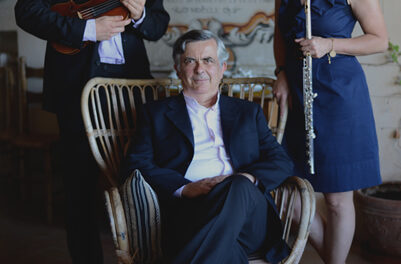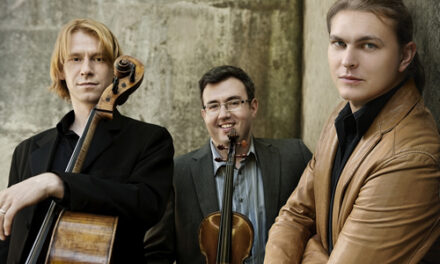After repeated efforts to capture the essence of Martin Luther King in his twice-revised I Dream, opera composer and librettist Douglas Tappin must keenly appreciate the biblical frustration of Moses on Mount Nebo – and of MLK behind a Memphis lectern on his final night. He has seen the Promised Land, but he cannot get there. The life of this civil rights icon is inextricably intertwined with his words, unforgettably spoken in Washington and Memphis, from his Atlanta pulpit, and written from a Birmingham jail, yet hardly a trace of them can be found in Tappin’s script. Opera Carolina’s latest remount of I Dream, which premiered in 2010 in Atlanta and is newly revised for the 50th anniversary of MLK’s assassination, is a more strategically refined and focused dance around the rhetoric with new stage direction – and considerable dramaturgical input – by Tom Diamond. James Meena, now entering his twentieth season as Opera Carolina’s artistic director, once again directed the orchestra, arguably with more ardor than ever for Tappin’s score.
If the music brings Porgy and Bess to mind, your concept likely chimes with Meena’s, for two of his principals, Alyson Cambridge as Coretta Scott King and Victor Ryan Robertson as Hosea, figured prominently in the storied revival of George Gershwin’s opera at Spoleto Festival USA in 2016. Kenneth Overton as Ralph Abernathy and Lucia Bradford as MLK’s Grandma are also steeped in that Gershwin masterwork. Yet it’s equally apt to note the influence of Broadway-style musicals on Tappin, whether it’s the revolutionary fervor of Les Miz or Andrew Lloyd Webber’s notion of opera in his Phantom. Certainly, Tappin’s music disarms any fear of being assaulted by discordant recitative and parched in a desert where no melody or aria is to be heard. On the contrary, ticket holders should brace themselves for a superabundance of power ballads.
The musical climax of the show, set in the Birmingham jail, is a duel of power ballads. Robertson challenges the whole non-violent ethos of King’s movement with a spirited, militant “No Victory by Love,” and Derrick Davis as MLK answers – still triumphantly, if audience reaction was any indication – with the anthemic title song. Davis and Tappin are at their best in showing us the visionary MLK and the staunch courage of his non-violent philosophy, but the libretto needlessly attempts to deepen our impression of King as a prophet. Repeatedly, Davis must dwell on a foreboding dream in which he sees the balcony of the Memphis motel where he will be shot. Perhaps Tappin believes this device cements King’s credentials as a prophet, though it actually undercuts them, for Davis must keep puzzling about the meaning of this dream – which is emphatically not the dream we associate with King. Overton as Abernathy, instead of all the substantial issues and concerns he might be discussing, must waste his time (and ours) by counseling his leader to confide Tappin’s invention to his dear wife Coretta.
One might quibble over whether MLK really dedicated his career to his Grandma, but Bradford’s rendition of “Sunday Is the Day” was certainly powerful enough to inspire dedication. If Coretta is also a formative presence in MLK’s career, there’s a place for Cambridge to sing “I Have Love to Give,” since it dovetails with her husband’s story and core beliefs, but “Midnight Moon” merely detains us in generic romance. While repeating a song with new meaning is a traditional Broadway device, its a bit problematic in Tappin’s hands. Late in the show when Cambridge sings “Queen Without a King,” she memorably expresses a steely determination to continue her martyred Martin’s work and assume a leadership role, a wisp of Evita that should take firmer root in Tappin’s score. Earlier, the song simply types Coretta as a weepy wife wishing her husband would stay home with family instead of pursuing a noble cause.
Sounding like a swaggering song that Crown might sing in Porgy, “No One’s Gonna Keep Us Down” took us deepest into Gershwin’s bluesy groove, and “Count to 10” worked surprisingly well in espousing MLK’s turn-the-other-cheek credo. “Top of the World,” a song of risqué celebration like “Masquerade” in Phantom, hinted at the danger of celebrity for King that could have made him vulnerable to the scheming of FBI director J. Edgar Hoover, who gets a sadly superficial airing that is also symptomatic of Broadway. He’s not an implacable Javert, that’s for sure.
If Martin’s womanizing or Hoover’s scandal mongering could have been shown as jeopardizing MLK’s greatest enterprises – the March on Washington, the march on Selma, or the Voting Rights Act – they would have rewarded deeper exploration. But in circling King’s greatest speeches, Tappin barely grazes what Memphis meant and almost completely ignores the March on Washington. That’s nothing short of astonishing vis-à-vis the expectations of an audience coming to see I Dream – until we consider that Tappin is skirting the actual quote, “I have a dream.” Gaping hole there as well.
To be fair, Tappin’s last two revisions were pre-pandemic, when the freshest take on King’s legacy was the Oscar-nominated Selma. No doubt about it, the march on Selma and its aftermath, in a presidential address by Lyndon B. Johnson, are the dramatic high points in Tappin’s revision, in Diamond’s staging, and Michael Baumgarten’s lighting and video design, climbing majestically on the shoulders of the Birmingham sequence. Meena was strong through all two hours and 18 minutes that Tappin’s music flowed through him, perhaps strongest when he was needed most, after Davis climbed the ramp to the Memphis motel balcony for the last time.
Before the pandemic, George Floyd, the 2020 landslide election, and January 6, I Dream was more on target than it is today. If he had rewritten his opera after last November, Tappin would likely have sharpened his libretto’s emphasis on the importance of voting rights. A revision after January 6 might have further prompted a reawakening to the significance of the August 28, 1963 March on Washington. For we do need reminding now what peaceful protest really is, how powerful and transformative non-violence can be, and how much more civil “I have a dream” and “We shall overcome” are as rallying cries than “fight like hell or you won’t have a country anymore.” Sadly, we also need to be reminded that Martin Luther King hoped to move us toward “that day when all God’s children, Black men and white men, Jews and Gentiles, Protestants and Catholics, will be able to join hands and sing.” The “you” that Donald J. Trump was addressing on January 6, 2021 belonged to only one of those groups, preferably those willing to march into the Capitol with a Confederate flag.













